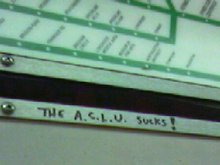By Jeff St. Onge, Bloomberg News May 15, 2007
MIAMI -- Jose Padilla aided terrorists and went to Afghanistan to train with Osama bin Laden's Al Qaeda network, a prosecutor said yesterday in opening the trial of the US citizen once accused of plotting to explode a radioactive "dirty bomb."
Padilla, 36, was arrested in 2002 and held in military custody without charges as an enemy combatant for more than three years. The dirty bomb allegation was dropped when he was charged in criminal court with supporting terrorism in late 2005.
"Jose Padilla became an Al Qaeda terrorism trainee, providing the ultimate form of material support, himself," prosecutor Brian Frazier told the jury of seven men and five women yesterday in US District Court in Miami. "Padilla got on a plane, went to the Middle East, and joined a terrorist training camp," Frazier said.
Padilla, a former Chicago gang member, and two codefendants are charged with conspiring to murder people in a foreign country and being part of a terror cell that provided money, equipment, and recruits to Islamic extremists such as Al Qaeda. The first charge carries a maximum sentence of life in prison. The three men aren't accused of committing any violent acts or being involved in the Sept. 11, 2001, attacks.
"The government has constructed a totally false picture," Jeanne Baker, a defense lawyer for codefendant Adham Amin Hassoun, told the jury and six alternates. "This case is not about Al Qaeda."
The defense contends that Padilla and the other two men supported legitimate groups aiding civilians in the conflicts in Bosnia and Chechnya, and that they did not aid Al Qaeda as the government alleges. Padilla's lawyers are scheduled to make opening statements later.
Among the prosecution witnesses, Frazier said, will be a US citizen who was part of a terror cell based near Buffalo and who attended the same training camp as Padilla.
That witness will testify about the type of training Padilla received and "just how rare it is for a US citizen to get to the heart of the Al Qaeda network," Frazier said. The prosecutor didn't identify the witness or give further details.
Padilla arrived in the Al Qaeda camp July 24, 2000, Frazier said. The indictment says Padilla filled out a "Mujahideen Data Form" that month. Other prosecution evidence will come from wiretaps of telephone conversations among the men dating to the mid-1990s, bank checks, and faxes.
Padilla and co defendants Hassoun and Kifah Wael Jayyousi are accused of supporting terrorist activities from 1993 to 2001.
"The defendants were part of a secret organization known as a terrorism support cell based right here in South Florida," Frazier said. "The common thread is the defendants' support for a violent jihad, or holy war, against the people they perceived as the enemy of Islam."
Padilla attended yesterday's opening statements wearing a suit and tie. His mother sat in an area reserved for spectators along with a male companion.
The trial may last into September, US District Judge Marcia Cooke has said.
Cooke previously ruled that prosecutors can mention the Sept. 11 attacks "in the most limited fashion" during the trial, though they cannot suggest any involvement by Padilla.
The judge ruled in February that Padilla is mentally competent to stand trial, rejecting his lawyers' argument that he was unable to assist in his defense because of abuse he alleges he suffered while in military custody.
His lawyers said that, while he was held in a US Navy prison in South Carolina, authorities drugged him, filled his cell with noxious fumes, and threatened him with severe injury. The government denies abusing Padilla.
Criminal evidence rules prohibit use of statements Padilla made to interrogators while he was in military custody because he wasn't allowed to have a lawyer present.
Padilla was arrested May 8, 2002, at Chicago's O'Hare International Airport after arriving from Pakistan. President Bush declared him to be an enemy combatant, and Padilla was held by military authorities for more than three years while his lawyers challenged his detention in the court system.
The Bush administration maneuvered to prevent the US Supreme Court from reviewing his case. After Padilla filed his appeal, prosecutors got an indictment in civilian court in November 2005.
The government then told the Supreme Court that Padilla's case was moot because the government no longer needed to hold him as an enemy combatant.
The Supreme Court rejected his appeal in April 2006.
Tuesday, May 15, 2007
Subscribe to:
Post Comments (Atom)

No comments:
Post a Comment